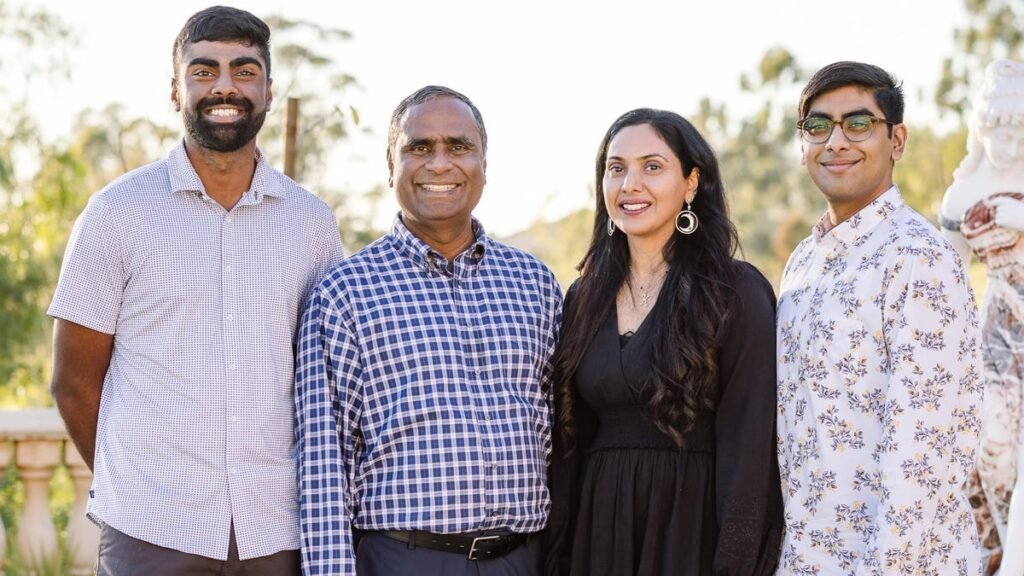Sahith Theegala never forgot the lesson he learned from his father, Muralidhar, about cheating.
Playing in a junior golf tournament at the tender age of 7 or 8, Sahith broke one of golf’s cardinal rules, intentionally moving his ball out of a divot. When he told Murli, as most call him, his father’s ever-present smile turned upside down and a lecture commenced.
“What do you expect to gain from cheating?” Murli said. “You’re doing yourself an injustice. Sure, your result is going to be better but it’s temporary. You’re not achieving anything.”
Unknowingly, he paraphrased one of golf’s famous sayings on the subject, uttered long ago by the great Bobby Jones: “When you cheat in golf, the only person you’re cheating is yourself.”
Fast forward roughly 20 years later and there’s proof that Murli’s lesson left an indelible impression. In August, during the third round of the 2024 Tour Championship at East Lake Golf Club, Sahith reported a penalty on himself at the third hole, immediately calling over playing partner Xander Schauffele and notifying a rules official that he believed he may have touched a grain of sand in a bunker on his backswing. A grain of sand!
Not even video could determine conclusively whether he had grazed the sand, but he was docked two strokes, which eventually cost him $2.5 million in prize money.
“I feel good about it,” Theegala said after the round. $2.5 million!
When pressed on the matter, Theegala said, “I wouldn’t be able to sleep [if I didn’t call the penalty].”
“That’s him,” said his mother, Karuna, and his longtime golf coach Rick Hunter added that the way he handled the infraction was “a reflection of the kind of person he is.”
Not to mention a reflection of his upbringing. On Saturday, Murli, 60, was honored as the 2025 Golfweek Father of the Year at an awards luncheon at Cabot Citrus Farms in Brooksville, Florida, as part of the Golfweek Father-Son Championship. It’s an honor that dates to 1983 and its recipients include Jack Nicklaus, Earl Woods and, most recently, Ernie Els.
Murli is an American success story and laid the foundation for Sahith to pursue his passion for golf. After graduating from Indian Institute of Technology with a degree in mechanical engineering, Murli packed his bags in 1987 and with little more than the money necessary to buy his plane ticket became the first in his family to move to the U.S. and seek a master’s degree in industrial engineering at Kansas State University in Manhattan, Kansas. After graduating, he bought a brown Dodge Aries with approximately 130,000 miles for $600 and drove to California to forge his own path.
But first, he went home to India to marry Karuna. It was a traditional Indian arranged marriage, and not long after Sahith was born in 1997, the same year that the Los Angeles Lakers acquired Kobe Bryant in a trade and Tiger Woods said, “Hello, world.” Through trial and error and a little bit of luck, Murli and Karuna figured out how to strike the right balance in blending their familial heritage in raising Sahith and his younger brother, Sahan, while allowing them to assimilate into American culture. Murli watched his twin sporting interests – the NBA and the PGA Tour – religiously, and as soon as he could afford a home in Chino Hills, in the southwestern corner of San Bernardino County, he bought Sahith a basketball hoop, followed by a set of plastic clubs when he was 3 or 4.
Hunter gave Sahith his first lesson at El Prado Golf Course in Chino Hills at age six and instantly realized that his new pupil had a gift. “He was born to do this,” Hunter said. “This was part of his purpose in life.”
By the time Sahith was 10, he had won his age group at the prestigious Junior World Golf Championships three times.
“The first time he won the Junior World, then I knew this kid is special and I need to do whatever it takes from my side to help him out,” he said.
That included sacrificing his career. Murli gave up a higher-paying job because of its 3-hour round-trip daily commute. By the time he got home every night, he was exhausted. Earning a healthy wage could pay for a certain lifestyle, but was it worth it? By the time he got back, it was time to pick up Sahith at the golf course. He was missing what mattered most. So, Murli took a pay cut, accepting a government position with a shorter commute that allowed him to leave work regularly by 4 p.m.
“A lot of his friends and family were like, ‘What the heck are you doing?’ People would say he might be a little delusional, but early on, he believed I was a special athlete and my mom was crazy enough to go along with it,” Sahith said.
Less pay but more time with his boys – that was priceless. “On more than one occasion, Murli told me he passed up a promotion because he didn’t want to be stuck in the office,” Hunter said.
Growing up in India, Murli’s studies were the priority. His father, a prominent cop in the community, never allowed Murli to play organized sports, and at first, the patriarch of the family didn’t understand his son’s vision for golf and struggled to accept the time commitment Murli devoted to it over his studies. That is, until he attended a California Kids Golf tournament when Sahith was 10 and watched him win. From the moment Sahith handed him his winner’s trophy, his grandfather became his hype man and biggest supporter.
“He always asked me about my golf,” Sahith said. “He was the only family member back in India that did that at that early of an age.”
Murli believed that Sahith could succeed both academically and in athletics. [While Sahith took to golf Sahan, six years younger, is a pre-med student at Seton Hall University.] El Prado, where Sahith practiced and played, is a hardscrabble municipal course where Hunter’s students took pride in their ability to play from scruffy lies. Murli developed a strategy of taking Sahith to tournaments all over Southern California – from San Diego to the Desert to the Valley – at an alphabet soup of junior circuits. It made economic sense as many of those events were held at private clubs that Sahith couldn’t otherwise play or high-end daily fee courses for a fraction of their rack rate. They’d show up early for practice rounds and they’d stay late so Sahith could hit range balls to his delight and putt on smooth, well-manicured greens.
“I got way better doing that,” he said. “And I loved it because I’m a golf addict.”
Good enough to earn a golf scholarship to Pepperdine University. Good enough to be named college golf’s Ben Hogan and Fred Haskins Award winner as the top male collegian. And good enough to graduate to the PGA Tour via the Korn Ferry Tour after turning pro in 2020. Murli and Karuna flew in for Sahith’s card ceremony at the Korn Ferry Tour Finals, a day Sahith calls the most emotional of his career. Of course, they were both there to see their pride and joy win the 2023 ProCore Championship at Silverado Resort in Napa. All those years after Murli scraped together his savings to buy a used car to get to California, Sahith bought him a new car with some of his winnings. Otherwise, Murli has refused just about everything else Sahith has offered him, other than a wallet.
Murli retired a year ago and Sahith has never seen him happier. He attends around 15 of Sahith’s PGA Tour tournaments a year and brings the energy of the Dallas Cowboys cheerleading squad to the golf course. At the Arnold Palmer Invitational in March, Murli predicted Sahith would hole his third shot for birdie, and lo and behold, he did just that. Murli danced around celebrating his son’s achievement and whipping the gallery around him into a frenzy.
Thanks to his appearance in the first season of Netflix’s “Full Swing” documentary on the PGA Tour, he has developed a cult following, signing autographs and posing for pictures, a permanent smile fixed upon his face. Murli’s affable, outgoing nature makes him easy to like, but why has he emerged as arguably the most beloved parent of a Tour pro?
“He doesn’t really care about societal norms,” Sahith said. “He’s an extrovert, loves to entertain and is just really into being himself. At the end of the day, he’s just a golf nut who loves being out here with his friends.”
But what makes Murli really light up? When fans and volunteers stop him to say that Sahith treated them like a perfect gentleman. “He cares a lot more about that than my actual golf results,” Sahith said.
And so when Sahith called the penalty stroke on himself at the Tour Championship, Murli and Karuna weren’t surprised that their son did the right thing. “They didn’t say much, which I think speaks to why they didn’t have to,” Sahith said. “If it was the other way around, they would have disowned me.”
That it happened at East Lake, where Bobby Jones had grown up and learned the game, felt like history repeating itself. At the 1925 U.S. Open, Jones had called a similar penalty on himself that no one else had seen, a violation of Rule 18, “moving a ball at rest after address,” and would hear no reasoning to the contrary. When a reporter congratulated him on his honesty, Jones admonished the reporter, saying, “You might as well praise me for not robbing a bank.”
While that sentiment still holds true for Sahith’s decision to self-report, it speaks volumes of good parenting and reason enough to shower praise on Murli and Karuna and their version of the American dream.
Read the full article here














